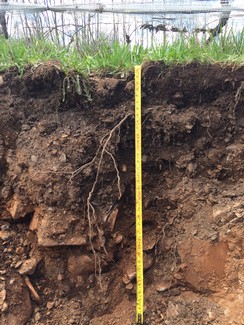L'Acadie Vineyards Blog
Welcome to the L'Acadie Vineyards blog and winery news
Climate change resilience and organic farming
We have long been supporters of Atlantic Canada Organic Regional Network ACORN, and they have good information on their website - a small excerpt shared below.
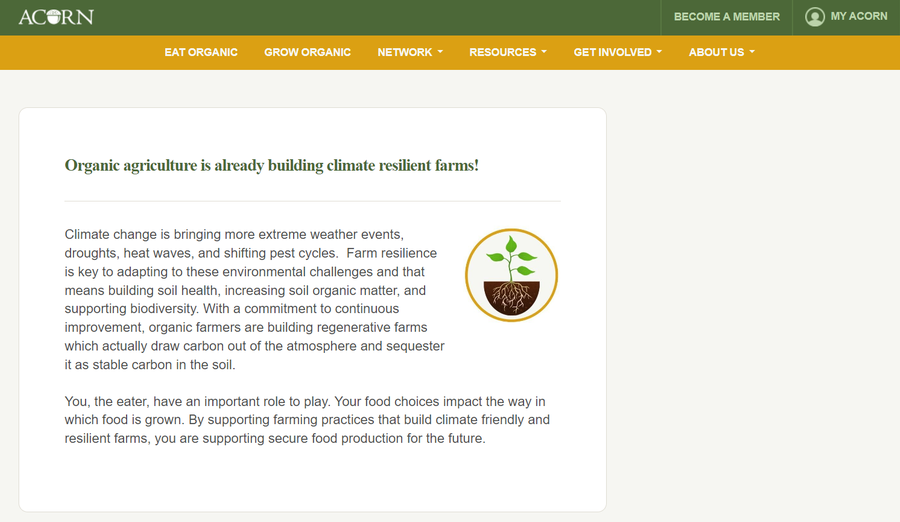
Climate change affects vineyards with extreme events such as severe winter damage to vines in British Columbia for the past two years, polar vortex in Nova Scotia last year with similar damage, and droughts in other wine regions of the world. Organic farming builds resilience AND contributes to a solution, as ACORN describes so well.
A couple notes about our organic and vegan practices:
- living soils - symbiotic fungi expand root zone influence by 2-10x for more water and nutrient availability, read more
- regenerative agriculture - cover crops between vineyard rows create biodiversity and pull carbon from the atmosphere and store it in soil, watch video about our cover crops
- livestock greenhouse gas generation - we are certified Biocyclic Vegan, no animal products from soil to glass, read more
Biocyclic Vegan and Organic. Veganic
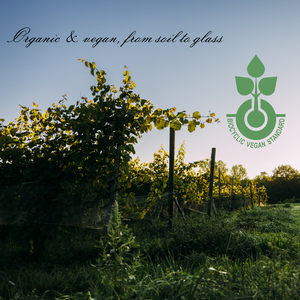
You may know that all of our wines are certified organic, but did you know that we are also certified Biocyclic Vegan?
In 2021, in addition to our long-standing organic certification, we became the first certified Biocyclic Vegan farm in North America. This progressive German-based organization has developed a rigorous & holistic standard to which we hold ourselves to. The Biocyclic Vegan ideology goes beyond most vegan certifications to include biodiversity, soil vitality, regenerative agriculture & social equity. We have been farming and winemaking veganically (vegan + organic) for quite some time and in 2021 found ourselves with a growing desire to seek certification to offer consumer transparency for our eco-conscious & plant-based fans. All the stars aligned when we discovered the Biocyclic Vegan standard!!
We love what they do, we love what we do, and we wouldn’t do it any other way. When you enjoy a glass of wine from L’Acadie Vineyards, you are guaranteed a certified organic & vegan wine, from soil to glass. 🌱🥂
📸: Alex Douglas
#biocyclicvegan #veganic #vegan #veganwine #organic #organicwine #veganagriculture
Economic impact of farm wineries in Nova Scotia
Cultivating a unique sense of place
L'Acadie Vineyards, as trailblazers in Nova Scotia's sparkling wine scene two decades ago, not only pioneered sparkling wine production and earned international accolades but also played a crucial role in developing our region's identity as a noteworthy wine destination. This success exemplifies the importance of farm wineries in cultivating a unique sense of place, fostering economic growth, and establishing Nova Scotia as a prominent player in the global wine industry.
Read more about how farm wineries are growing Nova Scotia
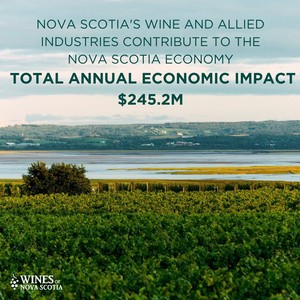 |
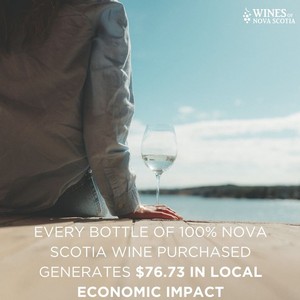 |
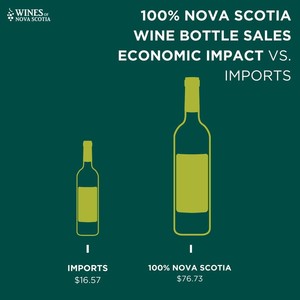 |
 |
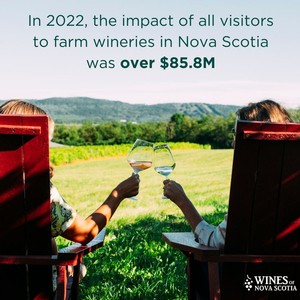 |
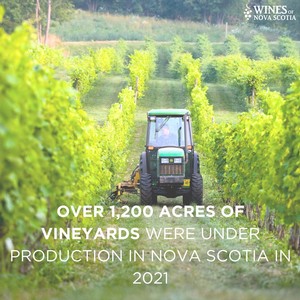 |
Drink Less, Drink Better
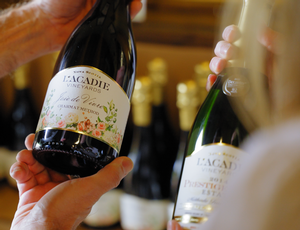
January is a good month to reset, reflect, plan and develop new healthier habits. Many are aiming to drink less alcohol and being more mindful of choosing wines when we do enjoy a glass. Vegan and organic wines are a delicious positive choice for the environment and your health.
There is plenty of research and information on vegan and organic farming benefits to soil, groundwater, air quality and bigger picture climate change, as well as individual health. In Europe, government funding for agriculture in most countries is tiered based on sustainability, with organic agriculture on the top pedestal. Recent examples include the Spanish region, Penedès, requiring all wineries to be organic, and the Italian government ruling that biodynamic farming, a largely animal-based practice, is not as sustainable as organic.
Read blog Why we are biocyclic vegan
Read more DO Penedès: new rules and aiming for Spanish wine’s top-tier
Read more Biodynamic farming favoured by Sting sees bill blocked in Italy
Most wine regions in Canada have identified economic impact study benefits for choosing local wine. In Nova Scotia, a local bottle contributes $76.73 and an import only $16.57 – very dramatic reasons to buy local. We should extend studies like this to include health benefits of sustainable wine and put monetary value on consuming less pesticide residues in your glass, reversing climate change from less carbon emissions, healthier soils and cleaner water and air. Governments have identified rising health care costs associated with certain lifestyles and, much like European governments supporting organic farming, they offer incentives for healthier choices. A “Health Impact” study for organic vegan wine could help guide their programs.
Organic coupled with local is always better especially when your local wine region is a cool climate producing naturally moderate alcohol wines. Instead of reaching for an organic Malbec from Chile at 15% alcohol, try an organic sparkling wine from Nova Scotia at 11% alcohol. Make your Tuesday night wine or your Friday night wine a celebration of health.
Read about our Vintage Cuvee in Vine Routes article 6 favourite vegan and earth-friendly wines
Decanter- Canada Calling: The wines exciting the experts now
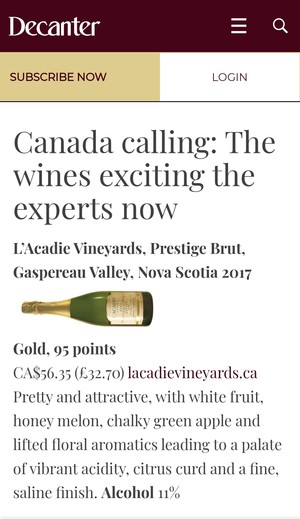
Proud to represent Nova Scotia wine in this Decanter article highlighting 15 Canadian wines that scored 95 points or more at the Decanter World Wine Awards earlier this year. Prestige Brut Estate 2017 award winning sparkling wine with an impressive 95 points and gold is the first ever Decanter gold for Nova Scotia wineries. It is an organic and vegan wine.
Learn more, or order 2017 Prestige Brut Estate
Read related blog about our big win Gold at Decanter world wine awards
Read Decanter article Canada calling: The wines exciting the experts now
Year in review 2023
Year in Review - 2023 curveballs
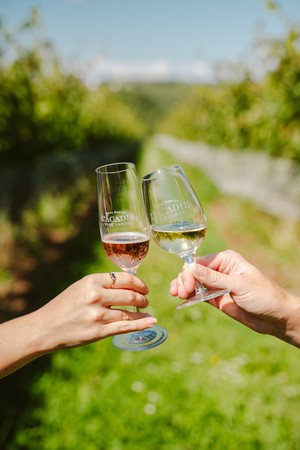
Mother Nature threw many curve balls at us this year. We are thankful on many fronts and perhaps most promising are the early indicators of resilience from farming our Gaspereau vineyard organically.
The polar vortex in February reduced our viable buds and we adjusted our pruning and other cultural practices. L'Acadie Blanc and Leon Millot had reasonable yields but not so with Chardonnay, Pinot Noir and Sauvignon Blanc. Hopefully new trunks that we carefully nurtured this year will give us good growth next year in these vinifera blocks. There was some vine loss with these more cold sensitive varieties but not nearly as much as we anticipated and perhaps attributed to deep reaching roots in our gravelly soil coupled with living organic soils rewarding us with a measure of early resilience in these young blocks.
Read our blog about climate change resilience from living soils
Then the rains came. The resulting high mildew pressures were very risky all summer and our organic viticulture was put to the test! Happy to say that we avoided significant diseases with the great work from our new vineyard supervisor, Chris.
See video of Chris explaining our organic and vegan vineyard practices,
Harvest started September 21 and we couldn't have been happier with finally getting dry, warm, shorts and t-shirt weather. And good timing for flavour development too! Everything was hand picked and whole cluster pressed with a gentle sparkling press program for best quality juice. The only exception to this daily routine was L’Acadie blanc fermented on its skins for our next release of Orange Wine coming from our Gaspereau winery in the spring.
The iconic signature in Nova Scotia didn't waver even with all the curveballs - consistent ripe grapes with great acidity and moderate sugar levels. We see it every year, no compromises, and it is this significant attribute of our cool climate that constantly validates our emerging sparkling wine region. Look for structured, lower alcohol and refreshing sparklings in future releases, and a dry crisp whites in the spring!
We earned many wine awards this year with Prestige Brut Estate and Vintage Cuvee leading our portfolio with golds from Decanter World Wine Awards and National Wine Awards of Canada, respectively. Very thankful for media attention and accolades for the first Decanter gold ever for Nova Scotia, throwing a spotlight on organic vegan wine quality.
Read our blog about Gold at Decanter World Wine Awards and Decanter's article Canada Calling: The wines exciting the experts now
Winter solstice resets our thoughts to reflect and calm as we plan the new season, the new cycle of life, for our 20th year. Very grateful.
~Bruce, owner winemaker
Top 10 reasons to buy L'Acadie Vineyards wine

Top 10 reasons to buy L’Acadie Vineyards wine:
- Supporting local keeps money in Nova Scotia.
- Lower alcohol of cool climate wines is better for your health.
- International and national wine awards. The first Nova Scotia winery to earn international awards for sparkling wine.
- Wine quality and authenticity have always been our business model demonstrated by consistent 100% Nova Scotia grapes.
- 100% organic wine with organic logo on all labels to assure traceability and transparency. Better terroir flavours and avoid pesticide and chemical residues in your glass.
- Vegan wine certified to Biocyclic Vegan Standard guarantees no animal inputs soil to glass.
- Organic and vegan vineyard practices protect soil, water and air quality to help save the planet.
- Prices are competitive with conventional wines.
- Convenient distribution with online, onsite retail, NSLC, private wine stores.
- Geothermal winery since inception for environmentally-friendly heating, cooling and hot water.
Sustainable Wine - how far have we come?
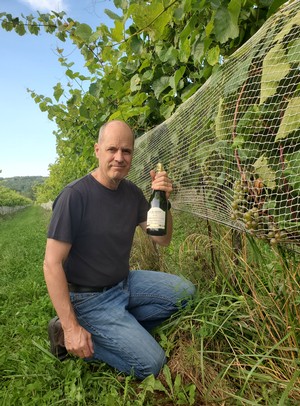
How far have we come? Sustainable wine may sound like a buzzword created by corporate wine executives to sell more wine and give impressions that all wineries must already subscribe to the concept because it's repeated in marketing so much and seems attainable but there remains a large gap between wine producers. You’d think the wine industry would have progressed the most since the beginnings of the environmental movement in the 1960’s, their marketing is so visible, seductive and competitive. But like climate change, microplastics and bee colony collapse there continue to be issues that our society has been slow to understand and act on. Why aren’t we more advanced? The alarm sounding, environmental catalyst classic Silent Spring by Rachel Carson was published in 1961 and the culture at the time was that synthetic insecticides will save the world. Her dystopian outlook for the environment affected by these persistent chemicals such as DDT threatened that culture and she was attacked and muffled by stakeholders and the misinformed. Scenarios repeated time and time again for the last 60 years.
Wine, the beverage of ingredients. If mother nature doesn't provide during the growing season, well there’s an ingredient for that. And the range is great – Mega Purple for colour, potassium sorbate for stability, crushed chestnuts for more tannin, gelatin for less tannin, citric and tartaric acids for more acidity, potassium bicarbonate for less acidity, even ethanol for more alcohol, and water for less alcohol. There are animal inputs like egg whites, gelatin, milk protein, and synthetic inputs like PVPP (plastic) and a broad range of synthetic pesticides. I introduce vineyard inputs here because whatever is added to the vineyard ends up in your glass as residual chemicals. Similar to Silent Spring’s explanation of the relationship of aerial spraying DDT on Elm trees and the residue on leaves killing robins via earthworms. Many pesticides are systemic, they protect the vine from within by being absorbed into tissues, vascular system and berries, and even contact pesticides are absorbed into the plant, like our skin absorbs. Most provincial liquor boards require a pesticide residue analysis before listing a wine because there are limits set. Limits that are recognized to be safe doses, not carcinogenic. But pause here and think about the last 60 years and how we seem to have learned so little. The World Health Organization (WHO) classified Roundup, a too common glyphosate weed killer used in vineyards, as probable carcinogen but changed it to possible carcinogen in the 80's after chemical industry lobby pressures. It is now back to probable carcinogen.
Read Organic diets quickly reduce the amount of glyphosate in people's bodies
Raise your hand if you are interested in sustainability. In protecting our precious environment and your health, and your community’s health. Brock University recently conducted wine research: An Exploration of Consumer Perceptions of Sustainable Wine. Over 700 people surveyed.
“Consumers with high involvement in sustainable wines tend to be younger, better educated, more involved in wine in general, and spend more per bottle than those with low involvement.” Pickering, Best, 2023
“Results show that sustainability-related cues are somewhat valued by consumers when making purchase decisions, but have low importance relative to the other cues examined. Environmental dimensions of sustainability have high saliency, in contrast with social and economic dimensions, and a significant minority of respondents report no or very limited knowledge of sustainable wines.”
There is change happening and it is generational – millennials and Gen Z are leading consumers. In Europe the changes are most apparent. Spain’s Denomination of Origin Penedès in Catalunya (DO Penedès) recently announced an extensive roadmap up to 2030, taking into account sustainability and establishing the region as a high-quality wine producer in Spain. Most immediately, all grapes for DO Penedès wines must be from fully-certified organic vineyards by 2025.
Full article: DO Penedes Organic Wine Plans by Decanter
European government funding for vineyards is based on level of sustainability, with certified organic being king. And as noted, quality is a large motivator for this Spanish region. Climate change resilience is a benefit too with cover crops, diversity and minimal tillage protecting the soil.
The organic approach is only natural inputs into grape growing and winemaking with every step monitored for traceability and transparency by rigorous third party inspections. Biodiversity of cover crops between rows create habitats for predatory insects such as parasitic wasps and dragonflies and protects the surface of the soil so that soil fungi and earthworms can cycle nutrients to roots which helps sequester carbon in a uniquely living regenerative agriculture system. Living soils are the goal of organics and nurturing it with composted grape pomace teeming with fungi extends vine root zone influence by as much as 10 times with symbiotic fungal filament networks. Vegan viticulture excludes animal manures that can lessen living soils and cause pollution of underground water systems. Vegan certified producers extend this concept to winemaking with no animal inputs. A common ingredient is gelatin and this is made from slaughthouse waste. Other ingredients not allowed in organic winemaking include synthetic preservatives, irradiated and genetically modified ingredients.
I’m in! How to find organic wines. Read labels and find organic vegan wines here! In Canada, only organic wines from soil to glass can bear the Canada Organic logo on the label. Wines that are made from organic grapes but not organic winemaking can not have the organic logo because the treatment of the wine after growing is unknown, and the integrity of chain of custody of grapes that went into bottles is equally unknown. Certification to the Biocyclic Vegan Agriculture standard, based in Europe, ensures wines have no animal inputs from soil to glass. This has far reaching benefits to climate change mitigation and animal welfare.

Discovering Rocks
Discovering Rocks
Our journey to find our unique terroir started when were still living in BC’s Okanagan Valley. Vacations to visit family in Nova Scotia always included visiting local wineries such as Domaine de Grand Pre and enjoying their delicious L’Acadie Blanc still wines - beautiful dry fruity wines with balanced crisp acidity that reminded me of the ideal structure for sparkling base wines that I pursued in Okanagan and sometimes failed to find. These wines were grown on typical heavy soils with loamy clay on south slopes and today I believe fruit expression from those sites is partially from soil water holding capacity and vigour. We were looking for a property to grow Nova Scotia’s first sparkling wine, so sipping wine and discussing soils late into the night centred on sparkling and where for OUR L’Acadie Blanc. I had experienced the effects of site and soil on wine characteristics in my BC career many times, a good example is Pinot Noir made from sandy soils of the hot Black Sage Bench sub-appellation compared to the more luscious juicy Pinot Noir from heavier soils and cooler days in adjacent Similkameen Valley, and I also understood the importance of harmony in a sparkling base wine – the balance between fruit expression and bottle aging toastiness. Guiding all of our discussions was a conviction to do it organically, for better flavours like I had seen winemaking at Summerhill Pyramid Winery, and for our family and neighbours' health.
We found our 30 acres of Gaspereau paradise online in BC. It was listed as a tourist accommodation business, hobby horse farm and residence, and the horse pasture caught our eye for grapes with thankfully no interventions on the land for years and protected from conventional agriculture with robust buffers. Many investigations later revealed rocky well-drained soil on a bench sloping 5% northwest, a uniquely different aspect and soil than the vineyards on other side of Gaspereau Valley and counter to the manta of the time “need south slope, need south slope”. Bubbling up from mixed local wine grower opinions was the long-standing history of good producing apple trees by the Duncanson family 50-100 years ago and our knowledge of matching soil, varietal and wine style. We took a chance that the terroir would give us the sparklings that we envisioned.
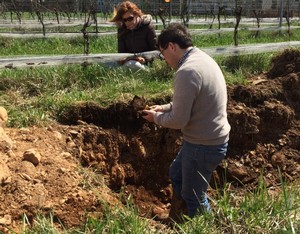
Next year marks 20 years and our decision to plant organic L’Acadie Blanc on these soils has been validated with numerous international sparkling awards. It hasn’t been easy for the vines as they slowly stretched their roots straight down deep through schist, sandstone, slate and gravels. Now they are strongly rooted with symbiotic networks of fungal filaments that further their reach for nutrients, making them more resilient to climate change and, more immediately apparent, sourcing and expressing their terroir very clearly. Wine judges have been noticing our flavours especially in organic wine Prestige Brut Estate sourced from a block that has more topsoil and more vigour.
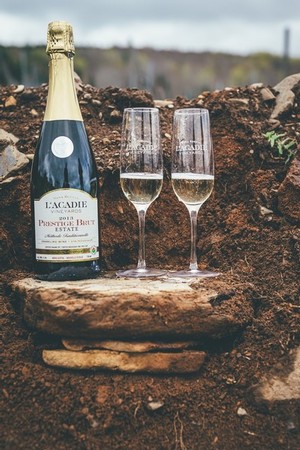
“Open and powerful nose with grilled hazelnut, pineapple, lemon and honey” 2010 PBE, Effervescent du Monde, silver
"A floral, apple nose with chalky lemon and creamy pear on the refreshing, mineral palate." 2013 PBE, Decanter, 92 points
"Complex apple, peach, nut and citrus bouquet with a toasty palate and fine mousse" 2014 PBE, Decanter, 92 points
"Perfumed with rose, white peach and toast; and a bright palate of zesty lime zest and apple." 2015 PBE, Decanter, 88 points
"Pretty and attractive, with white fruit, honey melon, chalky green apple and lifted floral aromatics lead through to a palate of vibrant acidity, citrus curd and a fine, saline finish." 2017 PBE, Decanter, 95 points
Minerality and more focused terms such as electricity, vibrancy and zesty can be used to describe our terroir and as well as an underlying descriptor of slight saline related to ancient seabed origins of our mainly sedimentary rocks. We continue to build the soil and rhizosphere with vegan viticulture inputs of composted grape pomace teeming with organisms and humus to nurture topsoil and below. This topsoil on top of rocky profiles is analogous to Champagne’s Grand Cru parcels with their topsoil over chalky soil and provides a living window to the surface contributing crucial elements such as atmospheric nitrogen fixed by clover and other plants in our cover crops.
To say we are excited about the future gifts our vineyard will yield is an understatement. Roots will get deeper and source more flavours, and we have expanded the estate to include new plantings of Chardonnay, Pinot Noir and Sauvignon Blanc.


